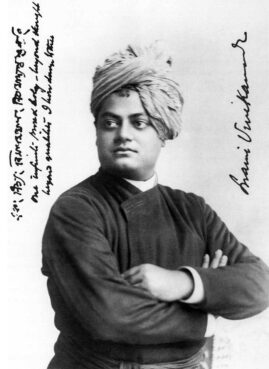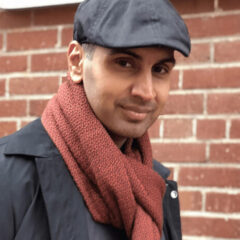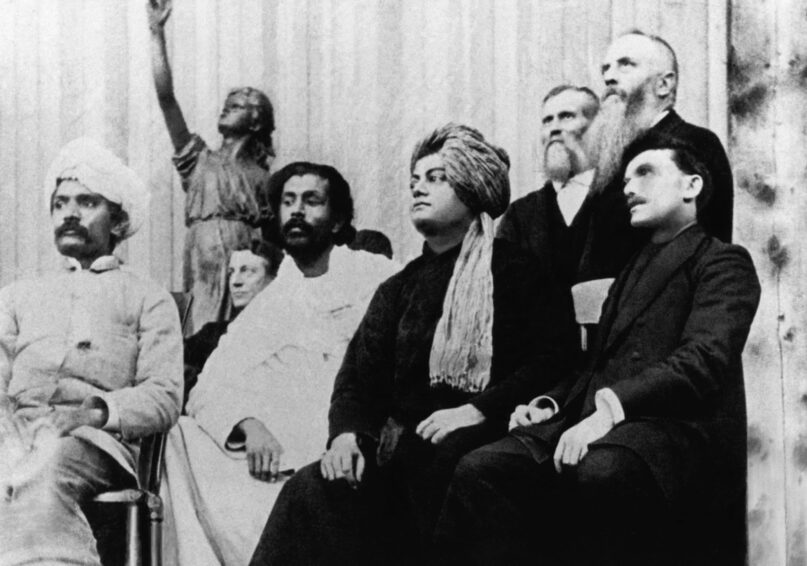(RNS) — In July 1893, a young Hindu monk from Calcutta (now Kolkata), India, arrived in the United States. His goal was to make the West aware of Hinduism, one of the world’s oldest faiths yet one that had been largely misunderstood, misinterpreted and vilified by the West.
Swami Vivekananda’s tour of the United States would mark what would become the first exposure most non-Hindus in the West had with Hinduism. Swami Vivekananda, born Narendranath Datta, was barely 30 years old and transformed into an international ambassador of the faith, thanks to his electrifying speeches at the 1893 Parliament of World’s Religions in Chicago and in invited lectures across the country.
Vivekananda became known as Hinduism’s missionary to the world, despite not seeking to convert others. His teachings were widespread around the United States, particularly through the propagation of Vedanta philosophy, the core of the Vedas, and the establishment of Vedanta Societies.
To mark the 130th anniversary of his arrival, the Free Library of Philadelphia and followers of Vivekananda’s philosophy have organized a symposium on his teachings, his message and his impact this Saturday. The April 29 symposium, which will be both in person and virtual, will feature talks by Swami Tyagananda, the head of the Vedanta Society in Boston and the Hindu chaplain at the Massachusetts Institute of Technology and Harvard; Deven Patel, associate professor of South Asian studies at the University of Pennsylvania; and Jeffery D. Long, professor of religion, philosophy and Asian studies at Elizabethtown College in Pennsylvania. The Rev. Stephen Avino, executive director of this year’s Parliament of World’s Religions, will also provide remarks on Vivekananda’s impact in understanding faith beyond an Abrahamic lens.
Long said Swami Vivekananda has an enduring legacy because he articulated the idea of religion and spirituality being a personal quest of self-improvement rather than collective tethering to dogma and doctrine.
“Swami Vivekananda spoke to universal concerns which are likely to remain relevant in all times and places: the quest for spirituality, and for a deeper meaning and purpose in life, and issues like the nature of consciousness, the nature of self, and the foundations of ethics,” he said. “Swami Vivekananda advocated for the freedom of individuals to pursue questions fearlessly, without being bound by dogmatism. His teaching is reflected in the emergence of the ‘spiritual but not religious movement.'”

Swami Vivekananda in Chicago during the Parliament of the World’s Religions in September 1893. Photo courtesy of Creative Commons
Divya Nair, a member of the Vedanta Society and a key organizer of the symposium, said Swami Vivekananda’s message of pluralism and personal connection to the divine remains powerful today.
“Often we think of religion as something apart from us but Swamiji teaches us to dive deep inward, tap into our innate strength and change our perception of what we are seeing,” Nair said. “As we encounter calamities of various scales and magnitudes today, this lesson is so important: We gain the strength to bear witness calmly and persevere patiently in our search for peace, reality and truth, no matter who or where we are.”
Leading up to the symposium, organizers have held weekly sessions on Vivekananda’s teachings, led by Patel. Nair said attendees have shared how much they have been inspired by the lessons and how much they learned about the pioneering monk.
A philosopher and activist ahead of his time
What made Swami Vivekananda so influential to Hindus and non-Hindus was his marriage of Hindu philosophy with practice. A disciple of the Hindu spiritual leader Sri Ramakrishna, Vivekananda explained the idea of yoga to the West. While the physical practice of yoga would become slowly separated from its Hindu philosophical roots in later years, Vivekananda was important in demystifying it to curious Westerners.
He was also one of the first international visitors to the United States to speak out against racial injustice. During one of his tours in the American South, Vivekananda spoke out against the segregation of train cars and other facilities, refusing to sit in the “whites only” section of a train, a privilege initially made possible by a white benefactor who sponsored his speech in Tennessee.
In India, Vivekananda spoke forcefully against the caste system, arguing it went against Hindu scriptures and was not indigenous to the Indian subcontinent. Though Vivekananda’s message was not different from that of hundreds of well-known Hindu sages, reformers and lay leaders who came before him, his impact was more pronounced because of his ability to articulate ideas to both Hindu audiences and British colonial authorities. Caste only became a legal identity in India during the British Raj in the 1800s, but Vivekananda argued any form of casteism ran counter to the core of Vedic philosophy, which teaches the oneness of all beings.
He also argued against the politicization of religion, particularly as it became weaponized to divide different groups.
“Swami Vivekananda spoke against fanaticism, bigotry and intolerance and argued for a harmony of religions,” Long said. “This message is still desperately needed as religion continues to be used as a way to divide humanity against itself and to justify violence.”
Though he died shy of his 40th birthday in 1902, Vivekananda’s legacy in the Indian subcontinent and across the world endures more than a century later, Long said, highlighting the “many scholars and artists who found inspiration in his teachings: writers like Christopher Isherwood, Aldous Huxley and J.D. Salinger; scholars like Joseph Campbell, whose work inspired George Lucas to create the “Star Wars” films, which contain echoes of Swami Vivekananda’s thoughts in the teachings of the Jedi; and musicians like George Harrison, who read Swami Vivekananda’s Raja Yoga early on in his own journey, and who himself inspired millions to look into Indian philosophy and meditative practice.”
Long added that despite this influence, Vivekananda is still largely unknown to many, especially in the internet age.
“I would say that Swami Vivekananda’s full impact on the world has yet to be fully felt and appreciated,” he said.

Murali Balaji. Photo via University of Pennsylvania
Organizers of the symposium hope they can help teach a new generation of learners about the legendary monk’s impact. For more information and to register for the symposium, visit the Free Library’s symposium page.
(Murali Balaji is a journalist and a lecturer at the Annenberg School for Communication at the University of Pennsylvania. He is the editor of “Digital Hinduism” and author of “The Professor and the Pupil,” a political biography of W.E.B. Du Bois and Paul Robeson. The views expressed in this commentary do not necessarily reflect those of Religion News Service.)





